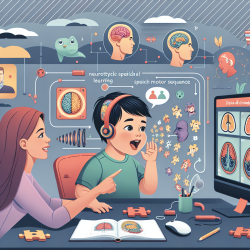For practitioners working with severely hearing-impaired children, teaching vowel sounds is a critical yet challenging task. The study "Training Severely Hearing-Impaired Children in Vowel Imitation" by Daniel Ling, PhD, and Clinton W. Bennett, PhD, provides valuable insights that can enhance your teaching strategies.
According to the research, hearing-impaired children often struggle with vowel production due to limited auditory feedback. The study emphasizes the importance of integrating tactile-kinesthetic (T-K) cues alongside traditional auditory-visual (A-V) methods to improve vowel imitation skills.
Key Findings from the Research
- Vowel Production Challenges: Hearing-impaired children have difficulty producing vowel sounds because they lack sufficient auditory feedback for correct tongue placement.
- Tactile-Kinesthetic Cues: Incorporating T-K cues significantly improves vowel imitation compared to using A-V cues alone.
- Operant Conditioning Techniques: Using operant conditioning techniques to reinforce correct vowel production can lead to superior performance in vowel imitation.
Practical Applications for Practitioners
To implement these findings in your practice, consider the following strategies:
- Incorporate T-K Cues: Introduce tactile-kinesthetic feedback in the early stages of vowel training. This can involve allowing children to feel the positions of their tongues and lips to better understand the required movements.
- Use Operant Conditioning: Employ operant conditioning techniques, such as positive reinforcement, to encourage correct vowel production. This could include using rewards like tokens or small toys.
- Monitor Progress: Regularly assess the child's progress through baseline and probe measures to ensure that the training is effective and to make any necessary adjustments.
Encouraging Further Research
While the study provides a solid foundation, it also opens the door for further research. Practitioners are encouraged to explore additional methods and techniques that could enhance vowel imitation skills in hearing-impaired children.
To read the original research paper, please follow this link: Training Severely Hearing-Impaired Children in Vowel Imitation.










